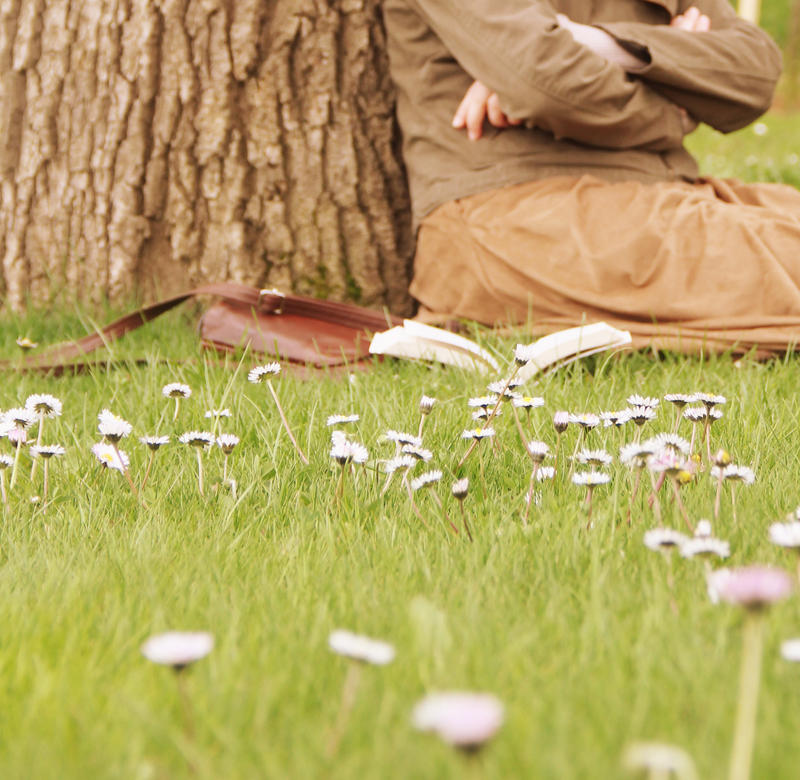 I do not remember when I first began searching for the sunset. I was on the road before I realized it had begun. My sister painted it into a picture for me once, and I believe that was when I first began to realize. The painting itself was nothing grand: a simple daub of watercolours depicting the silhouette of a girl on a hill against a flaming sky. It was a spin-off of one of the hills in my parent's neighborhood. I had watched many a sunset just so, many times.
I do not remember when I first began searching for the sunset. I was on the road before I realized it had begun. My sister painted it into a picture for me once, and I believe that was when I first began to realize. The painting itself was nothing grand: a simple daub of watercolours depicting the silhouette of a girl on a hill against a flaming sky. It was a spin-off of one of the hills in my parent's neighborhood. I had watched many a sunset just so, many times.But I stopped to look at the painting on its place by my door one day on my way to work, and that was when I realized how distant the sunset was. Fifty-some miles would take me to that same hill; it would not take me to the sunset. The impression of a day gone by - or a day foretold - in an artist's mind; it was not mine to grab. It was too bold and surreal - or perhaps it was too real, the grass on those shadowed hills surely too sharp for my soft and shadowy feet.
I seemed to shake, for just a moment, with a curious longing to expel myself through the veil of the picture frame and stand beside that girl and stare into the face of glory. The voice of Chesterton seemed to ring in my ears: whether it was hell or the furious love of God, I did not know...! But it was early in the morning, and the dim lamp in my room seemed to turn things black and white by turns. Only the picture burned with a maddening brightness, as far removed from my little room and the day ahead of me as eternity is from finite things.
Twelve and a half hours later, I stepped out of a side-door of the hospital and stopped exultantly to breathe of the autumn air. The gentle briskness of the dusk revived my sagging spirits. There was pine in the air; this particular side-door opened into a garden, which (sorry and shabby as it was) held enough charm for my literary mind to walk my body through as often as I possibly could. Thus it was, the cold air biting gently at my face and arms and the pine trees tugging at my nostrils, that I caught sight of the rosebushes. They were draggled and beaten down by the fires of summertime, but now it was autumn and they lifted their blossoms in sweet defiance. On an impulse, I grabbed one and carried it as booty to my car: a simple tea-rose, more wild than not, red and yellow mixing into coral around its hips. The colors burned in the twilight, like the lingering rays of the sun that had already set.
I sang all the way to my car, but the rose was limp and wearied when I reached home, and still the sunset-image mocked me from my wall. Under the lamp's baleful glare, the rose was a tawdry thing: cheapened, gaudy, the trinket of a silly child. I had given my heartsong for a thing that was now pale and dying. I threw the flower on my dresser and went about the business of sleep, dismayed and restless.
I found the rose as I hunted a rogue hair-pin down the next morning. I did not mean to stop at the door on my way to work, nor look at the painting, nor be bothered with flowers, but I retrieved it with a pang of sentimentality. It was dry and the thorns were still clinging up by the flower amidst the curling leaves. It was not the song of my heart the night before; it was a dead thing, a thing thrown away, with no charm except that of a thing given up for the past. But the scent of a rose is supposed to be sweet even after death, and as I sampled it with half a glimmer of regret, the painting caught my eye again.
Then I looked at the rose again, and I knew. It was as though a piece of the sunset-sky had dropped out of the frame and fallen into my hands. I thought I had found beauty in the rose that I plucked just outside of a door I had been walking through every day. But that rose had only been a shadow, an incompletion. Death had darkened its colours, burning the scarlet and gold of the watercolor-sunset all over its petals. It would never be the sunset, but perhaps there were windows and these things dropped through all the time, and the only way to lay hold of them was to let go.
Perhaps there was happiness in these grave emergencies, and happiness in knowing that the painting could be found by being lost. These colours were not so far off and foreign after all.
Perhaps there was happiness in these grave emergencies, and happiness in knowing that the painting could be found by being lost. These colours were not so far off and foreign after all.
all along the way the road is paved
with little moments of truth.
Andrew Peterson




"...and the only way to lay hold of them was to let go."
I know what you mean. That's all.
Being lost isn't hard. It's getting lost in the right place that takes some skill.
Unless of course you're talking about actually losing something, which brings up the question of losing something which wasn't yours to begin with.
Or perhaps I can merely gaze and wonder at the thoughts floating past, knowing I can only hope to actually understand what I'm admiring. :)
No, you're onto it: Whoever would keep his life must lose it - or Lewis's spin-off, roughly paraphrased: Aim for heaven and you get earth thrown in. Aim for earth and you get neither. Be entranced by the One Who Is Eternal, and you will find that He has placed eternity in the heart of man, and beautiful glimmers burst through quiet, ordinary life in a myriad of ways. Yes, we see through the glass darkly, but not inert; we are pressing forward, moving from glory to glory. Death has died; he is a tool, a means to an end in the hands of Life - and the end will be beautiful, and the here-and-now cannot help screaming that it is so. Precious things in paintings and withered flowers.
Thank you, Anna, I love this!
This makes me think (immediately) of Frost's Poem, "Nothing Gold Can Stay."
"[Nature's] early leaf's a flower; But only so an hour."
You're in good company if you're in the company of Frost. :)